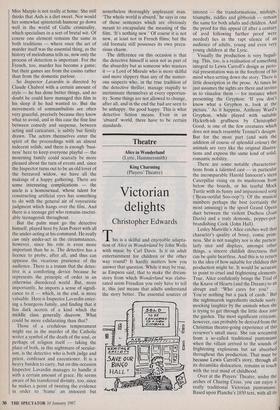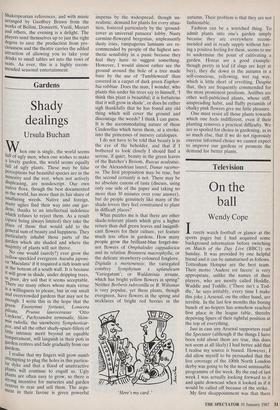Theatre
Alice in Wonderland (Lyric, Hammersmith) King Charming (Players' Theatre)
Victorian delights
Christopher Edwards
This is a skilful and enjoyable adapta- tion of Alice in Wonderland by John Wells with music by Carl Davis. Is it an adult entertainment for children or the other way round? It hardly matters how you answer that question. While it may be true, as Empson said, that to make the dream- story from which Wonderland was elabo- rated seem Freudian you only have to tell it, this just means that adults understand the story better. The essential sources of
interest — the transformations, mishaps, triumphs, riddles and gibberish — remain the same for both adults and children. And the proof for this appeal (if after a century of avid following further proof were needed) lies in the rapt silence of an audience of adults, young and even very young children at the Lyric.
Visually the production is very beguil- ing. This, too, is a realisation of something integral to Lewis Carroll's design as picto- rial presentation was in the forefront of his mind when setting down the story. There is little description in the prose. At times he just assumes the sights are there and invites us to visualise them — for instance when presenting the Gryphon: 'If you don't know what a Gryphon is, look at the picture.' As it happens, Anthony Ward's Gryphon, while played with suitable Hjckrrh-ish gruffness by Christopher Good, is one of the few creatures which does not much resemble Tenniel's designs. But for the most part (and with the addition of course of splendid colour) the animals are very like the original illustra- tions and express the same kind of solid, romantic nobility.
There are some notable characterisa- tions from a talented cast — in particular the incomparable Harold Innocent's stern Caterpillar rising on its mushroom from below the boards, or his tearful Mock Turtle with its funny and impassioned song ('Beau-ootiful Soo-oop'!). Of the musical numbers perhaps the best (certainly the most amusing) is the spoof Grand Opera duet between the violent Duchess (Joan Davis) and a truly demonic, pepper-pot- brandishing Cook (John Hall). Lesley Manville's Alice catches well that character's quality of bossy, comic prim- ness. She is not naughty nor is she particu- larly nice and displays, amongst other things, a sincere childish directness that can be quite heartless. And this is to return to the idea of how suitable for children this production might be. It would be accurate to point to cruel and frightening elements. True, Alice confidently brings the Trial of the Knave of Hearts (and the Dream) to an abrupt end: 'Who cares for you? . . • You're nothing but a pack of cards.' But the nightmarish ingredients include nasty, mocking laughter by the animals when she is trying to get through the little door into the garden. The most significant criticism, however, can probably be derived from the Christmas theatre-going experience of this reviewer's small niece. She ran screaming from a so-called traditional pantomime when the villain arrived to the sounds of frightening explosions but sat absorbed throughout this production. That must be because Lewis Carroll's story, through all its dreamlike dislocation, remains in touch with the real mind of childhood.
Over at the Players' Theatre, under the arches of Charing Cross, you can enjoy a really traditional Victorian pantomime. Based upon Planche's 1850 text, with all its Shakespearian references, and with music arranged by Geoffrey Brawn from the works of Bellini, Donizetti, Verdi, Mozart and others, the evening is a delight. The players send themselves up to just the right degree to save the production from pre- ciousness and the theatre carries the added attraction of allowing you to take your drinks to small tables set into the rows of seats. As ever, this is a highly recom- mended seasonal entertainment.











































 Previous page
Previous page